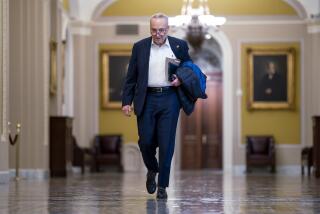Clinton and Kohl Agree Russia Is Top Priority : Diplomacy: President and German chancellor emphasize importance of reforms and offer encouragement to Yeltsin.
- Share via
WASHINGTON — President Clinton said he and German Chancellor Helmut Kohl agreed Friday that the West’s “paramount challenge” in the post-Cold War era was supporting democratic and economic reforms in Russia.
Both offered fresh encouragement to embattled Russian President Boris N. Yeltsin.
“During the Cold War, our two nations stood shoulder to shoulder in the common effort to contain communism,” Clinton said after a White House meeting with Kohl. “Today, we must be leaders in the great crusade of the post-Cold War era. . . . These are critical days.”
Clinton said he still is working on an expanded aid package to present to Yeltsin at their April 3-4 summit planned for Vancouver, Canada. He said he and Kohl discussed additional steps that U.S. allies could take to help Yeltsin speed the pace of reform in Russia.
“I am very grateful . . . for the courage and determination you have documented . . . in standing by Boris Yeltsin,” Kohl told Clinton. “Both of us are aware that any type of setback would be much more expensive than any type of assistance we are discussing.”
For Clinton, the session with Kohl was the latest in a series of White House meetings with world leaders as he crafts an aid package to support the political and market reforms in Russia and throughout the former Soviet Union.
Clinton said the United States and Germany “are committed to doing everything we possibly can to keep democracy alive in Russia.”
Kohl said Germany, because of its proximity to the former Soviet Union, would be affected “first and foremost” if there were a return to totalitarian rule in Moscow.
Both leaders took time during their session with reporters to promise continuity in U.S.-German relations and aggressive efforts to resolve obstacles to global trade agreements.
“The chemistry is right,” Kohl said of his initial meeting with Clinton.
Clinton too had a salute for Kohl, saying the German leader had “proved himself time and again to be a true friend and staunch ally of the United States.”
Clinton and Kohl said trade issues and the longstanding U.S.-German ties were discussed at their meeting, including a new academic and cultural exchange program.
But it was the crisis in Russia that dominated the day.
Taking questions from reporters, Clinton said he would present Yeltsin with ideas for U.S. assistance as well as a coordinated Western effort to help Russia advance democratic and economic reforms. The president provided no specifics.
In Japan meanwhile, a government official said Yeltsin had been invited to Tokyo in July to the annual summit of the Group of Seven main industrial nations.
Tokyo, this year’s G-7 host, said it would also hold a meeting of G-7 foreign and finance ministers on April 14-15 to consider ways of helping Russia as it attempts the transition from a command economy to a market-based society.
A Russian aid package now being put together by G-7 leaders is likely to be worth more than $20 billion, the Nihon Keizai Shimbun, Japan’s business daily, reported today.
The package, which would be in addition to $24 billion promised by G-7 nations last spring but not completely delivered, would include loans from the World Bank and the International Monetary Fund as well as direct bilateral aid from G-7 nations.
Japan, which has previously shown reluctance to grant substantial aid to Russia until it resolves ownership of disputed islands with Moscow, is expected to offer to extend payment schedules on $600 million in debt and offer an additional $100 million in the form of subsidized loans.
Japan’s chief Cabinet secretary, Yohei Kono, said a senior Russian official, possibly Deputy Prime Minister Boris G. Fyodorov or Foreign Minister Andrei V. Kozyrev, would be invited to the April meeting.
The G-7 comprises Britain, Canada, France, Germany, Italy, Japan and the United States.
More to Read
Sign up for Essential California
The most important California stories and recommendations in your inbox every morning.
You may occasionally receive promotional content from the Los Angeles Times.













